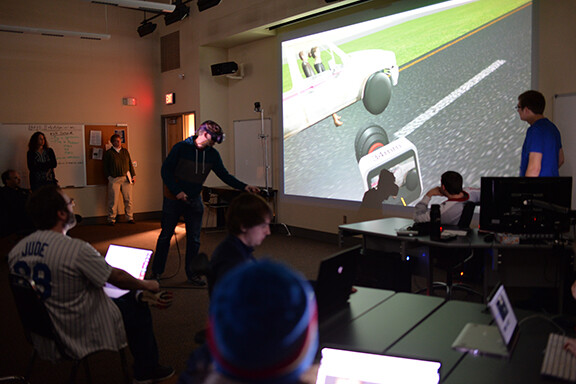
Student work from a new virtual reality course that connected theater and film with computer science and engineering disciplines will be featured during live demonstrations starting April 24.
During the spring semester 19 University of Nebraska–Lincoln students enrolled in a “Projects of Virtual Reality” course developed applications and environments in a virtual reality simulator. The groups will present their work in three sessions during the week of April 24. Those sessions, which are free and open to the public and offered from 1 to 3 p.m. each day, are:
April 24, Nebraska Union, Crib
April 26, Avery Hall, Room 12
April 27, Van Brunt Visitors Center, Great Hall
The projects include a house environment where the participants solve puzzles, a museum heist game, a space adventures environment, an application for creating film storyboards, and a two-player game where participants compete in separate rooms.
Becca Horzewski, senior computer science major, said her team created an interactive space for their final project.
“My team’s goal with our final project is to see how immersive and realistic we can make a space by making everything in the space interactive,” Horzewski said. “We also drew influence from ‘The Stanley Parable’ and ‘The Witness,’ and we’re creating a game where your goal is to figure out the important thing you need to do that day, with some guidance from the narrator, some environmental storytelling and a fair amount of humor.”
Ben Hartzell, senior film and new media major, and his team developed a tool that allows filmmakers to pre-visualize a scene or movie in virtual reality, generating storyboards and other information for the day of production.
Hartzell likes the way the class has been taught, allowing the students 10 weeks to create their final project.
“My favorite thing is the open sandbox environment and creating your own curriculum and being able to only really do whatever interests you,” he said. “That has given me a lot more enthusiasm and a lot more drive to get work done.”
The team that includes David Cao, a senior computer science major, is working on a multiplayer game.
“Two players in separate VR setups, maybe in separate rooms or buildings, would join that same team,” Cao said. “One of them would be a gunner or someone in the field fighting enemies, and then the other one would be in the control room. They would be in separate places, and they have to collaborate.”
Each of the class teams features a mix of disciplines, allowing the students the opportunity to learn to work together
“This is the first class I’ve had that’s been truly cross-disciplinary, and I think it is a great experience to collaborate with people whose skillsets are very different from my own,” Horzewski said. “The film and new media students were able to make all the art assets and record professional-quality audio; whereas, the computer science students, such as myself, were able to write the code that makes the objects behave like we want them to.”
The new course was taught by Steve Kolbe, associate professor of film, and Christopher Bourke, assistant professor of practice in computer science.
Kolbe said he reached out to the computer science colleagues because he knew he didn’t want to teach the class without their assistance.
“I knew there was no way we could actually pull off a class by ourselves,” Kolbe said. “We’d end up spending most of the semester just learning the scripting language enough to where we could do something rudimentarily simple.”
Bourke was already interested in virtual reality, so he joined Kolbe in leading the class.
Participating students were handpicked by Bourke and Kolbe for the first-time course.
“We knew that if we just opened it up to anybody that wanted to, we would get 50-100 people, and we only have two VR sets, and we would end up with a bunch of people that didn’t have the skills that were required,” Bourke said.
Overall the instructors have been happy with the cross-disciplinary creations. Bourke and Kolbe hope the course will return in a future semester with a possible expansion to a year-long class and including augmented reality.
The students also have enjoyed the course and look forward to showing off the projects.
“We’ve all learned so much by dreaming up something that interests us and bring it to virtual life,” Horzewski said. “We have gotten experience working on the edge of a very new and rapidly developing field, and I’m really enjoying it. Virtual reality is still new enough that not many people have experienced it, and I think there’s a tendency to underestimate the potential this technology has. I’m really looking forward to showing off the projects.”







